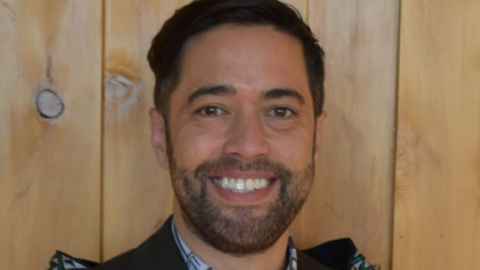Nathan Chong-Nee
Over his career as a social worker, Nathan Chong-Nee has worked across youth and community development, served as Principal Child Protection Officer for the government of Samoa and taken part in global leadership initiatives. He is now chief executive of Te Rōpū Tauwhiro o Aotearoa, the Aotearoa New Zealand Association of Social Workers.

Nathan Chong-Nee's journey in social work is deeply entwined with his own personal process of reclamation and decolonisation – reconnecting with his reo and whakapapa, understanding who he is and standing on the shoulders of those who came before.
“My whakapapa gives me grounding,” he says. “It reminds me that this mahi is woven through generations and carried collectively, never by one alone.”
Over more than 17 years in the social services sector, Nathan (Te Rarawa, Samoa with ties to England and Ireland) has worked across youth and community development, served as Principal Child Protection Officer for the government of Samoa and taken part in global movements for leadership and change, including the Young Pacific Leaders initiative and the Obama Foundation Asia-Pacific Leaders programme.
Looking back, he says his studies at the University of Auckland were a pivotal part of his journey, particularly his Postgraduate Certificate in Health Sciences, where he focused on child and adolescent mental health.
“That opened my eyes to the tension between Western and Indigenous worldviews, and how we can navigate both to honour mana and well-being.”
Nathan also earned a Master of Social Work (Professional), which gave him a theoretical grounding and the practical skills necessary to thrive in his field. But it was outside the classroom where some of the deepest lessons emerged.
“During placement, I experienced financial hardship that forced me to the edge, and it made it clear how inequitable and unsustainable some parts of our system are,” he recalls. “That lived experience continues to fuel my advocacy for fairer support for social work students. I carry that time with me as a reminder of the barriers many face, and why we must dismantle them.”
Nathan traces his drive to serve others to his family, in particular his parents and his grandfather, and describes his career as “an unfolding guided by whakapapa and the hopes of those who came before”.
“I trust in my tīpuna and in the dreams that each generation carried through threads of migration, hoping for a better life for the next. I stand on the shoulders of my parents, grandparents and wider whānau. The choices and sacrifices they made gave me the privilege of education, allowing me to do what I do today.”
In his current role as chief executive of the Aotearoa New Zealand Association of Social Workers, which represents nearly 4,000 members, Nathan’s responsibilities stretch across governance, finance, political advocacy and media.
“One day I’m in Parliament speaking with ministers, the next I’m on the street protesting injustice or standing in solidarity with those whose voices are often silenced. That tension between systems and resistance is part of the mahi, and I hold it with care.”
And although he admits that at times the job can be challenging, his passion remains undimmed.
“Social work keeps us close to humanity – to grief, joy, injustice and hope,” he says. “It is an honour to be trusted with this mahi; to challenge systems, speak truth to power and uplift marginalised voices. The work can be tough, but I am sustained by the solidarity of those committed to change.
“For me, that same sense of collective strength is captured in a whakataukī I discovered in an artwork in Rawene, where my nana was born, a tohu that reflected back what I have always believed: the mahi I do is never mine alone. ‘Ehara taku toa, he takitahi, he toa takitini’ – my strength is not that of one, but of many.”